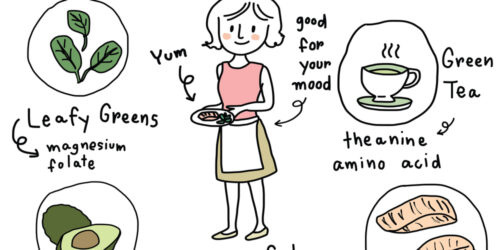Power of Food: How Anti-Inflammatory Foods Can Relieve Stress

Table of Contents
In today’s fast-paced world, stress has become an all too common experience. The good news? Nature has provided us with a way to combat stress through the power of food. Anti-inflammatory foods not only support overall health but can also play a significant role in relieving stress and promoting a sense of calmness. In this article, we’ll explore the fascinating connection between anti-inflammatory foods and stress relief, and discover the top food choices that can help ease the burden of everyday tension and anxiety.
Understanding Inflammation and Stress
When we’re feeling stressed out, it’s not just in our minds – our bodies feel it too! Inflammation and stress are closely linked, like best friends that influence each other’s behavior. The effects of stress can lead to inflammation in our bodies, which isn’t just about swelling or redness, but a whole host of reactions that can mess with how we feel day-to-day. Getting to know how these two are connected can help us find the right foods that put us back on the path to feeling awesome.
The link between inflammation and stress
When life gets hectic, your body can react in some unexpected ways. You might have heard that stress can literally inflame the situation. That’s because stress and inflammation are linked—when you’re stressed, your body’s defense system kicks into high gear as a response. This defense system can trigger inflammation, which is actually a good thing if it’s short-term, helping to protect your body.
However, when stress doesn’t let up, and inflammation becomes a long-term guest, it can cause trouble. Your body is like, “Enough already!” but the stress doesn’t stop, and neither does the inflammation. This can lead to a cycle of ongoing tension and inflammation that can affect how you feel every day, making you feel drained and on edge. Recognizing this connection is the first step to breaking the cycle and feeling better.
How Inflammation Affects the Body’s Response to Stress
Did you know that when you’re stressed out, your body is actually going through a complex battle on the inside? It’s all about inflammation—your body’s natural defense to threats like infections and injuries. But stress tells your immune system to kick into high gear, even if there isn’t a physical injury to heal, and that’s where the trouble starts.
Your stress hormones, like cortisol, usually help by controlling this inflammation. But if stress drags on, these hormones can’t keep up, leaving inflammation to run wild in your body. This can lead to feeling tired, anxious, or even depressed. It’s like a chaotic party happening inside you, and it can contribute to health problems down the line, from high blood pressure to heart disease. It goes to show, controlling this internal stress response can be a game-changer for your wellbeing.
Identifying Stress-Related Inflammation Markers
When you’re feeling the heat from a stressful day, your body might be sending out silent signals called inflammation markers. Think of them like little red flags that your cells wave around, telling you there’s trouble brewing inside. C-reactive protein (CRP), for one, is a telltale sign of inflammation in your body. It’s like a silent alarm that goes off when stress has been hanging around too long.
Another marker to keep an eye on is something called tumor necrosis factor-alpha (TNF-alpha). This one’s a bit like a double agent; it’s helpful in small amounts but causes chaos when there’s too much. When you’re under stress, levels can go up, letting you know it’s time to take action. Spotting these markers early can help you fight back with, you guessed it, the right food choices and lifestyle changes.
The Role of Anti-Inflammatory Foods

Often, we don’t realize that what we put on our plates has the power to influence how we feel on the inside. It’s like having a secret weapon in the form of tasty eats that do more than just satisfy our hunger—they actually help our body combat stress. This is where foods with anti-inflammatory properties come into play. They offer a double benefit: boosting our health while keeping our stress levels in check, making them a fundamental piece in the puzzle of stress management.
What are anti-inflammatory foods?
Have you ever thought about using your kitchen to help you chill out? That’s right – certain bites can actually help your body fight off the kind of inflammation that’s linked to feeling stressed. These superfoods are like your body’s own little peacekeepers, working to dial down the heat and keep things nice and calm on the inside.
So, what exactly falls into this category? Anti-inflammatory foods are packed with nutrients that go to bat against inflammation in your body. They’re like the superheroes of the snack world, filled with vitamins, minerals, fiber, and antioxidants. Think colorful fruits and veggies, nuts, fatty fish, and even some spices that not only add a kick to your meal but also to your health!
How Anti-Inflammatory Foods Impact Stress Levels
Have you ever wondered how munching on a crispy apple or savoring a piece of salmon can change your mood? It turns out that what we feed our bodies goes beyond just filling our stomachs—it affects how we feel, too. When we’re stressed, our body’s inflammation levels can go up. This is where anti-inflammatory goodies step in to soothe both our bodies and minds.
By bringing down inflammation, these foods can help our brain send out more of the good signals, like the kind that make us feel happy and relaxed. Imagine you’re in a loud, busy room—that’s your body on stress. Anti-inflammatory foods are like soundproofing that makes everything calmer. When we regularly eat these calming foods, they can support a steady mood and keep stress at bay. It’s like having a secret weapon in the kitchen that helps us fight off the stress monsters!
The Connection Between Gut Health and Stress Relief
Ever heard the phrase “gut feeling”? Well, it turns out there’s more truth to it than you might think. Our gut health is like a hidden superpower when it comes to dealing with stress. Inside our bellies, millions of bacteria are hard at work, and they have a big impact on our mood and how we handle stressful situations.
Scientists have discovered a complex communication network between the gut and the brain, often called the gut-brain axis. When our gut is happy, filled with the right kind of bacteria, it sends positive signals to the brain. But when it’s not, things can go the other way, and that’s when we might feel anxious or stressed out. By choosing foods that are good for our gut, we’re actually creating a peaceful environment inside that can help fend off the negative effects of stress. Just think of it as keeping your inner health in balance to keep peace of mind.
Top Anti-Inflammatory Foods for Stress Relief

Let’s dive into the heart of nature’s pharmacy and unearth some edible treasures that do wonders for easing stress. Imagine your kitchen stocked with vibrant foods that not only tantalize your taste buds but also soothe your mind. These aren’t just tasty choices—they’re your allies in calming the everyday storm of stress. We’ll reveal a handful of these powerful choices, each loaded with properties that help dial down inflammation and bring about a tranquil state of being. Whether it’s the golden touch of turmeric or the leafy embrace of greens, get ready to transform your meals into a source of serenity.
Turmeric: Nature’s Golden Antidote
Did you know that turmeric has been used for centuries as a healing spice? It’s like nature’s very own chill pill, with a bright golden color that isn’t just for looks—it packs a punch for your health too. The main superhero compound in turmeric is curcumin, which is a boss at fighting inflammation.
What’s super cool is that curcumin has properties that help chill out your body’s stress response. By reducing inflammation, it helps your body cope with stress more efficiently. So, by adding a dash of turmeric to your meals, you’re not just spicing things up—you’re helping your body take a deep breath and relax. To get the most out of turmeric, it’s a good idea to pair it with black pepper, which boosts your body’s ability to absorb curcumin.
Leafy Greens: The Powerhouse of Nutrients
When it comes to fighting off stress, don’t underestimate the power of leafy greens. They are packed with vitamins, minerals, and fiber which are essential for maintaining a healthy body and a clear mind. Leafy greens such as spinach, kale, and Swiss chard are loaded with stress-busting nutrients like magnesium, which is often called nature’s relaxant.
These vibrant veggies also boast a high content of folate, a nutrient that helps produce mood-regulating neurotransmitters like serotonin and dopamine. By reaching for a bowl of greens, you’re essentially fueling your body with the good stuff that can counteract the negative vibes that come with stress. So, next time life throws you a curveball, consider adding a hearty helping of greens to your plate to help you stay calm and carry on.
Berries: Vibrant Antioxidants for Calmness
When it comes to unwinding and easing tension, don’t look any further than the produce aisle. Berries are like nature’s chill pill; they’re packed with antioxidants that work wonders for calming the mind. These small but mighty fruits are loaded with vitamins and flavonoids that help reduce inflammation, thus taking a load off your body’s stress response.
Snacking on a handful of berries can go a long way. They’re not just tasty; studies suggest that berries can help in regenerating the cells in our bodies, lowering blood pressure, and improving our reaction to stress. The bright colors of strawberries, blueberries, raspberries, and blackberries aren’t just for show—they’re indicative of the various phytochemicals that support our overall well-being. So the next time you feel the weight of the world on your shoulders, grab a berry mix and enjoy the sweet relief!
Fatty Fish: Omega-3’s Stress-Reducing Effects
When it comes to unwinding and keeping stress at bay, fatty fish might just be your new best friend. Packed with omega-3 fatty acids, these swimmers help your brain manage anxiety and stress. Omega-3s are known to reduce inflammation, which is a key factor in the stress response of the body.
Eating fish like salmon, mackerel, and sardines is like giving your brain a spa day. Research shows that these fats play a crucial role in cell function and are linked to improved mental health. So, next time you need to chill out, consider having a nice piece of grilled salmon. It’s not only tasty, but it could also help you feel more relaxed.
Dark Chocolate: Indulgence with a Stress-Less Twist
Dark chocolate isn’t just a treat for your taste buds, it’s also packed with properties that can help soothe your nerves. The secret is in the cocoa, which is teeming with flavonoids. These natural compounds have been shown to boost brain health and improve mood. But it’s not just about the flavonoids, dark chocolate also encourages the release of endorphins, those feel-good hormones that give you a natural high.
When you’re feeling the pressure, reaching for a small piece of dark chocolate might be more beneficial than you think. Aim for chocolate with a high percentage of cocoa, as this means it’s less processed and contains more of the beneficial compounds. Just remember moderation is key – a little goes a long way in both satisfying your sweet tooth and in helping to reduce stress without overloading on calories.
Integrating Anti-Inflammatory Foods into Your Diet

When it comes to fighting off stress the tasty way, weaving nature’s best soothers into our meals can do wonders. Think of your diet as a palette, with colorful fruits and veggies, hearty grains, and powerful spices all blending together to create your personal masterpiece of calm. By learning to slip these foods into our everyday munching routine, we paint a picture of health where each bite brings us closer to serenity. Let’s dive into the art of making every dish not just a delight to our taste buds, but a balm for our busy minds.
Simple and Delicious Anti-Inflammatory Recipes
Eating right doesn’t have to be a chore, especially when it comes to soothing your stress with food. Imagine diving into a plate full of flavors that not only tantalize your taste buds but also help keep your stress levels in check. Recipes that pack a punch of anti-inflammatory ingredients can lead to a less stressed, more vibrant you. They are your secret weapon in the battle against the stressors of daily life.
Take a colorful salad, for instance, sprinkled with crunchy nuts, and drizzled with a ginger-infused dressing. Or perhaps a warm, golden-hued curry that gets its color from turmeric, loaded with vegetables and legumes. These kinds of meals aren’t just good for your mood; they are a treat for your body too. They’re essentially comfort food with a healthy twist – meals that your body will thank you for later.
Tips for Creating Stress-Reducing Meals
Are you tired of feeling frazzled at the end of each day? Relief might just be a meal away! Creating dishes that fight inflammation can be your secret weapon against stress. It’s all about choosing the right ingredients and keeping it simple.
Start with a rainbow of vegetables, toss in some high-quality protein, and drizzle things with healthful fats. The simplicity of these meals makes them easy to prep, even on your busiest days. Remember, a meal that’s easy on your mind is just as important as one that calms it.
- Go for color: Bright veggies are not only visually appealing but packed with vitamins.
- Keep it balanced: A little carb, some protein, and good fats keep you full and happy.
- Spice it up: Herbs and spices add flavor without the stress of extra calories.
- Plan ahead: Prep ingredients early so you can throw together a meal when you’re short on time.
With these tips, you’ll be whipping up relaxing meals without breaking a sweat. Who knew your kitchen could be a stress relief sanctuary?
Incorporating anti-inflammatory foods into daily eating habits
Making room for foods that fight inflammation on your plate doesn’t have to be a chore. It’s all about slipping these nutritional powerhouses into your meals without a hitch. Start by adding a sprinkle of turmeric to your scrambled eggs, or toss a handful of spinach into your morning smoothie. It’s easy and tasty!
Think about swapping out some of your usual snacks for a punnet of blueberries or a square or two of dark chocolate. These simple switches not only give your body a burst of nutrients, but they can also help calm your stress levels without you even realizing it. Add some salmon to your weekly menu for an omega-3 boost, and watch these habits grow into a full-blown lifestyle.
Lifestyle Factors That Complement Anti-Inflammatory Foods

Eating well is just one piece of the puzzle when it comes to reducing stress levels. Lifestyle choices play a massive role in amplifying the benefits you get from your diet. Pairing the right foods with healthy habits can supercharge your stress relief efforts. From regular physical activity to quality sleep, and adopting calming practices, your daily routines can significantly enhance how your body manages stress. Let’s dive into how these factors work hand in hand with your diet to keep your mind and body at their best.
The impact of exercise on stress and inflammation
When we talk about battling stress, we can’t just focus on what’s on our plates—our daily activities play a colossal role too. Exercise is a champion in this arena, known for its sweeping benefits, and it’s not just about building muscles or stamina. It kicks off a cascade of positive biochemical reactions in your body, including the release of endorphins—those fantastic little hormones that crank up your happiness and ease feelings of stress.
But here’s something super interesting: hitting the gym or jogging around the block isn’t just good for your mood. It also battles inflammation, which often buddies up with stress. Moderate, regular exercise fires up your body’s anti-inflammatory response. This means that with every sweat session, you’re literally cooling down the internal fires of inflammation that stress likes to kindle. Remember, keeping inflammation at bay is like giving stress one less musketeer to team up with against you.
The role of adequate sleep in stress management
When we talk about feeling refreshed, we’re really talking about the magic of a good night’s sleep. Sleep is like hitting the reset button for your body and mind. It’s not just about getting enough hours of shut-eye, but also about the quality of sleep you’re getting. Quality sleep gives your body the time it needs to repair and rejuvenate, which is absolutely crucial when you’re dealing with the day’s stresses.
In fact, when you snooze, your body gets to work on reducing levels of inflammation. This is super important because inflammation can crank up stress and even lead to a pile-up of stress-related issues. By giving yourself the gift of restful sleep, you’re setting the stage for a more relaxed, focused, and energized tomorrow. So, don’t skimp on sleep—it’s a powerful ally in keeping stress and inflammation at bay.
Stress-relieving practices for a holistic approach
Alongside giving your diet a makeover with foods that keep inflammation in check, embracing stress-relieving practices can really set you on the path to a more chill life. Meditation and mindfulness take the spotlight here, letting you slow down and find your zen. They’re like a broom for your brain, sweeping away the mental clutter and making room for peace and clarity.
Don’t forget to add regular exercise to the mix. It’s like hitting a reset button on your body’s stress levels. And when it’s time to hit the hay, making sure you get plenty of quality sleep is key. It’s like plugging in your phone to charge – you want to wake up with a full battery, ready to face the day’s challenges. Pair these with your anti-inflammation eats, and you’re well on your way to tackling stress from all angles.
The Future of Anti-Inflammatory Nutrition

As we continue to dig deeper into the world of nutrition and health, one thing is clear: What we eat significantly affects our well-being. With emerging research focusing on the impacts of diet on our mental state, particularly in regards to easing tension and unease, the arena of anti-inflammatory nutrition is witnessing a surge of innovation. This exciting frontier promises to reshape how we approach our meals, moving toward a future where our dinner plates are not just satisfying, but also tailored to managing our mood and stress levels.
Emerging research on food and stress management
In the realm of wellness, scientists are continuously uncovering new insights that highlight the profound impact our diets have on mental wellbeing. Recent studies delve into how certain eats can counteract the negative effects we experience from stress. It turns out, what we munch on can play a pivotal role in how we cope with life’s daily pressures.
Exciting developments in this field are pointing toward the existence of natural compounds in foods that may attenuate stress markers in the body. These findings suggest that reaching for the right kind of snack could be akin to providing our brains with a soothing balm. What we are starting to see is a science-backed menu for managing stress, with ingredients that do more than just please the tastebuds—they promote inner tranquility.
Innovations in Anti-inflammatory Food Products
The world of nutritional science is constantly evolving, bringing forth new and exciting products that are designed to combat inflammation and ease stress. Innovators are making waves with edibles that are as delightful as they are beneficial for our health. Take, for example, the rise of functional beverages that go beyond mere hydration—drinks infused with natural anti-inflammatory agents like ginger, turmeric, and even CBD oil, aiming to reduce inflammation and help the body manage stress more efficiently.
On supermarket shelves, you might now find a range of snacks that do more than just satisfy your mid-afternoon cravings. Imagine indulging in a decadent bar of dark chocolate that’s not only a treat to your taste buds but also packed with stress-relieving qualities. These munchies are cleverly crafted with inflammation-busting ingredients, ensuring that with each bite, your body receives a dose of calm. It’s this innovative fusion of great taste with health-supportive properties that’s setting the stage for a new era in dietary choices, centered around well-being without compromising on flavor.
The Potential for Personalized Anti-Inflammatory Diets
Imagine dining on a meal that’s like a gentle hug for your cells, tailored just for you to melt away the day’s stress. That’s the idea behind personalized nutrition plans geared towards fighting inflammation. Personalized anti-inflammatory diets are not one-size-fits-all; they tailor to your body’s unique needs, taking into account your genetic makeup, lifestyle, and even microbiome composition.
In a world where everyone’s body reacts differently to various foods, science is pointing towards a future where we can customize our plates to optimize our health. Researchers are hard at work, sorting out how to best match specific foods to individual inflammatory profiles. This way, it isn’t just about what you eat; it’s about what’s best for you to eat. As we understand more about this connection, you might one day visit a nutritionist who’ll whip up a dietary blueprint designed specifically to keep your stress in check, using data driven straight from your DNA.
Conclusion
By harnessing the power of anti-inflammatory foods, we can take proactive steps to manage stress and promote a balanced, harmonious lifestyle. Incorporating these vibrant and nourishing foods into our daily routine can be a delicious and rewarding way to nourish both the body and the mind, paving the way for a calmer, more resilient approach to stress management.
FAQs
Q: What are anti-inflammatory foods for stress?
A: Incorporating anti-inflammatory foods into your diet can help manage stress. Some examples of such foods include fatty fish (like salmon), leafy greens, berries, nuts, seeds, and olive oil. These foods contain antioxidants and omega-3 fatty acids that may have stress-relieving properties.
Q: How does eating food relieve stress?
A: Eating can have both physiological and psychological effects on stress. Physiologically, certain foods can influence the production of neurotransmitters like serotonin, which contributes to mood regulation. Psychologically, the act of eating can provide comfort and a sense of routine, contributing to stress relief.
Q: What are the benefits of eating anti-inflammatory foods?
A: Consuming anti-inflammatory foods can offer various benefits, including reduced inflammation in the body, improved immune function, and better overall health. These foods may also positively impact mental well-being, potentially helping to alleviate stress and anxiety.
Q: How can doing something for someone else help to relieve stress?
A: Engaging in acts of kindness or helping others can trigger the release of oxytocin and serotonin, neurotransmitters associated with feelings of happiness and well-being. This can lead to a “helper’s high” and a sense of purpose, ultimately reducing stress and promoting positive emotions.
Q: What are 3 common techniques to help deal with stress?
A:
- Deep Breathing Exercises: Practice deep, diaphragmatic breathing to activate the body’s relaxation response.
- Regular Exercise: Physical activity helps release endorphins, which act as natural mood lifters and stress relievers.
- Mindfulness and Meditation: Techniques such as mindfulness meditation can help in focusing the mind on the present moment, reducing stress and promoting mental well-being.
Q: How to reduce mental stress?
A:
- Identify Stressors: Recognize and understand the sources of stress in your life.
- Healthy Lifestyle: Prioritize regular exercise, a balanced diet, and adequate sleep.
- Time Management: Organize tasks, set realistic goals, and prioritize responsibilities.
- Social Support: Connect with friends and family for emotional support.
- Relaxation Techniques: Practice techniques like deep breathing, meditation, or yoga.
- Professional Help: Consider seeking assistance from a mental health professional if needed.
Useful resources
- Harvard Health: Foods that fight inflammation: https://www.health.harvard.edu/staying-healthy/foods-that-fight-inflammation-guide This website offers a science-backed overview of anti-inflammatory foods, including specific examples and the mechanisms behind their beneficial effects.
- Healthline: 18 of the Best Stress-Relieving Foods: https://health.clevelandclinic.org/eat-these-foods-to-reduce-stress-and-anxiety This article focuses on the connection between stress and inflammation, providing a list of specific anti-inflammatory foods and explaining how they can help combat stress and anxiety.
- Cleveland Clinic: Eat These Foods to Reduce Stress and Anxiety: https://www.webmd.com/diet/ss/slideshow-diet-for-stress-management This resource delves deeper into the mind-body connection, highlighting the role of certain nutrients like magnesium in reducing stress and anxiety, offering specific food suggestions rich in these nutrients.
- Fortune: The most anti-inflammatory foods you can eat to improve energy, mood, and sleep: https://www.health.harvard.edu/staying-healthy/foods-that-fight-inflammation This article expands on the benefits of an anti-inflammatory diet beyond stress relief, discussing its potential to improve energy, mood, and sleep quality.







